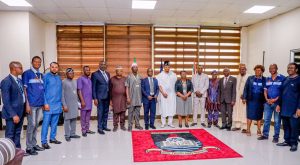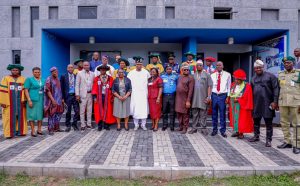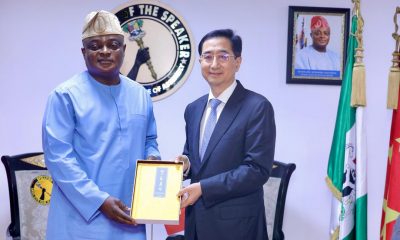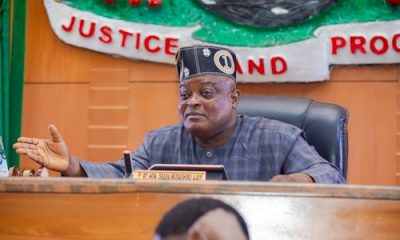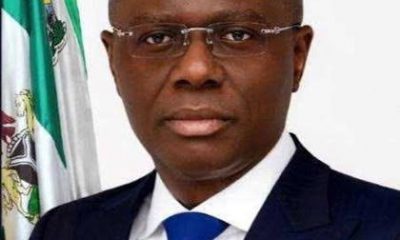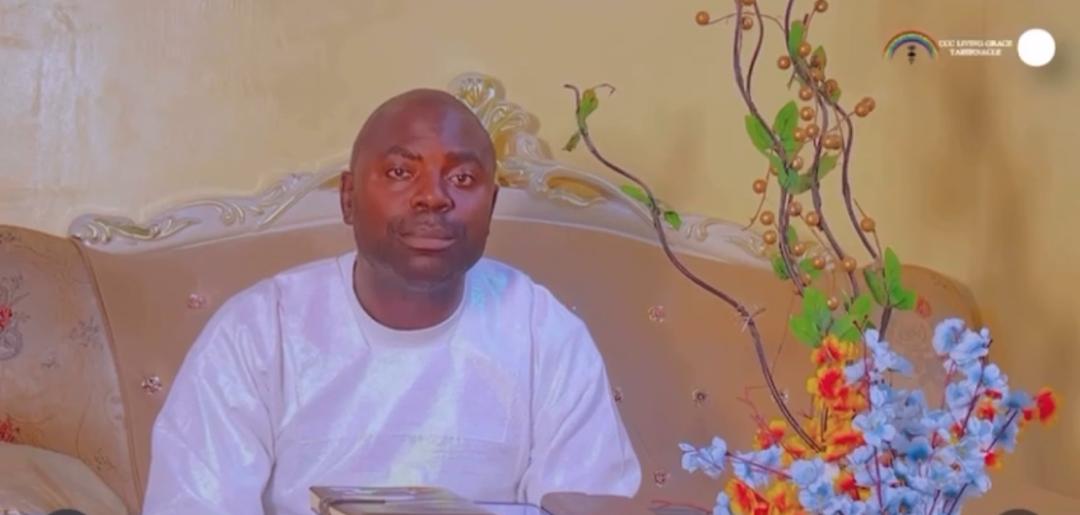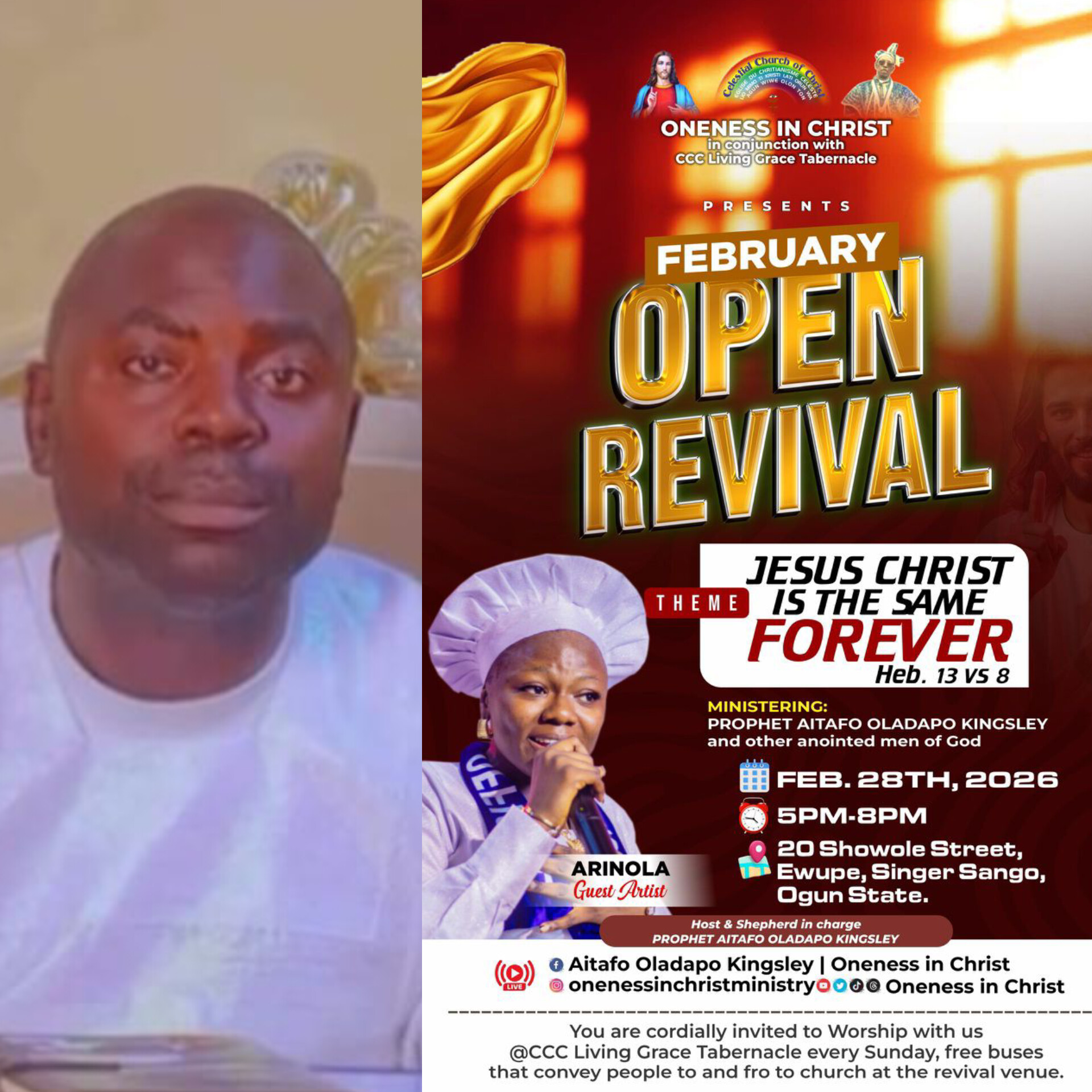news
Insecurity: Lagos Speaker Advocates True Federalism, Implementation of Panel Reports
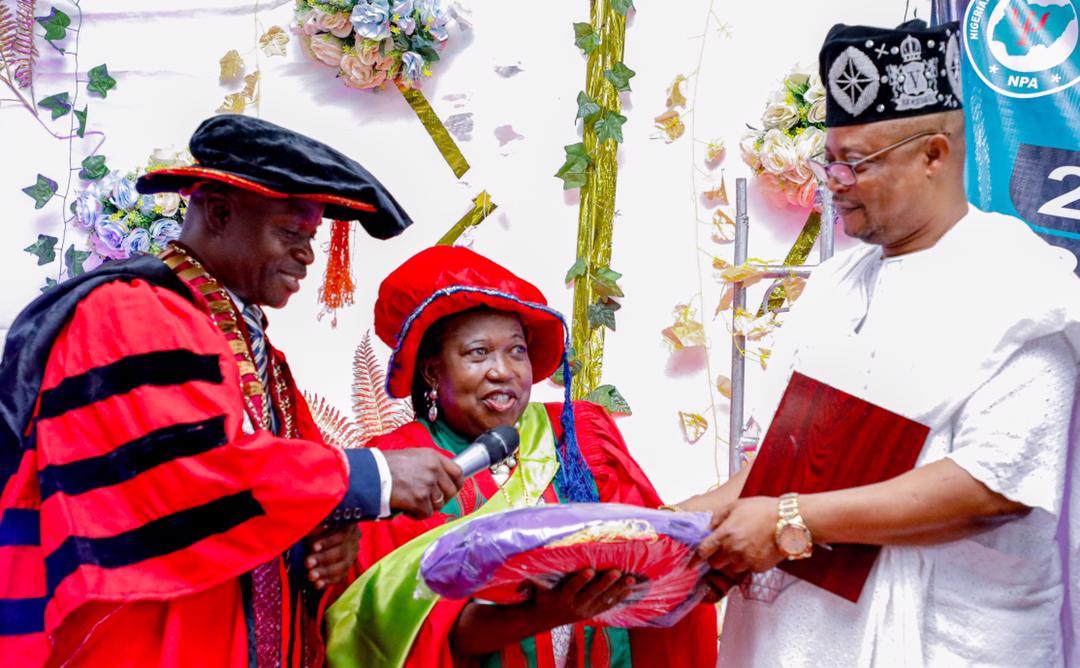
Insecurity: Lagos Speaker Advocates True Federalism, Implementation of Panel Reports
Says Lagos Government Proactive On Issues Of Security
Suggests State, Community Policing Systems
The Speaker of the Lagos State House of Assembly, Rt. Hon. (Dr) Mudashiru Obasa, has described Nigeria as a country that desires true federalism as part of the solutions to the nation’s security crisis.
Dr. Obasa stated this on Wednesday at the 2022 National Congress and Scientific Conference of the Nigerian Psychological Association held at the Lagos State University.
The Speaker, who was awarded Honourary Fellow of the academic body, lamented that insecurity had continued despite the federal government’s deployment of financial and other resources to its fight.
He also urged the federal government muster the political will to implement the recommendations of different panels and committees that have investigated immediate and remote causes of insecurity in the country.
Represented by Hon. Victor Akande, chairman of the House Committee on Judiciary, Human Rights, Public Petitions and LASIEC, Obasa further advocated for sincere national mediation, negotiation, arbitration, reconciliation, and broad amnesty as modern conflict resolution strategies where necessary.
Speaking on the topic, ‘Security and National Sustainability’, Obasa described Lagos as one of the safest states in the country owing to the proactive efforts of all the tiers of government in the state.
“Here in Lagos State, we’ve taken preventive steps to ensure that law and order do not collapse for no good reason. We established the Neighbourhood Safety Corps because we are aware of the critical need for quick response from local security officers at the grassroots level.
“The state government’s efforts, led by the Neighbourhood Safety Corps and aided by the other security officers on the ground, have made Lagos a secure place to live for everyone.
“There is, however, reason to believe that the federal government would support the same objective by establishing a state police force. Community preventative policing, as opposed to curative policing, is crucial for maintaining national security in light of the current state of affairs. Constant contact between the security agencies and community people is necessary to get the country out of its current situation.
“At the same time, all three tiers of government should work to significantly cut spending on administration, which includes things like defence and domestic security. As one might expect, this is crucial if we want to see progress in the real sectors of the economy,” Obasa said.
The Speaker, while noting that military action and confrontational approach tend to increase violence rather than decrease tension, added: “to rehabilitate all militants who embrace reconciliation, however, we need to place a greater emphasis on the concepts of mediation, negotiation, arbitration, reconciliation, and broad amnesty as modern conflict resolution strategies.
“The principle of true federalism advocated by militants in the Niger Delta and other groups should be adopted because it guarantees genuine political autonomy and the right to control resources.
“In a similar vein, the federal government and other stakeholders in Nigeria’s violent sociopolitical and ethnically based crisis need to muster the political will to carry out the recommendations of the numerous panels and committees set up to investigate the immediate and remote causes of the crisis.”
He attributed insecurity to a number of factors including the country’s inheritance of a faulty security structure and the failure of successive governments to effectively restructure the system.
Beyond impacting knowledge, the Speaker tasked tertiary institutions to be interested in the affairs of the nation as part of their contributions to the sustenance of national progress.
He commended the NPA and LASU for honouring him as he promised to continue to play roles for the advancement of Nigeria.
Earlier in his address, Prof. Olukayode Afolabi, President of NPA, lamented the security situation of the country saying it now affects every facet of Nigeria’s development and forcing investors away.
Among other suggestions, he said there was an urgent need to bring psychologists into the recruitment and development processes of security personnel.
On her part, Prof Adenike Boyo, Deputy Vice Chancellor (Academics) of LASU who represented the Vice Chancellor, Prof. Ibiyemi Olatunji-Bello, expressed hope that the 5-day conference would add value to Nigeria’s development.
Eromosele Ebhomele
Chief Press Secretary to the Speaker of the Lagos State House of Assembly.
news
Journalists for Good Governance Shines Searchlight on Local Government Administration

Journalists for Good Governance Shines Searchlight on Local Government Administration
…Calls for Accountability in Nigeria’s Grassroots Governance
LAGOS, Nigeria — A civil society coalition known as Journalists for Good Governance(JGG) has intensified public debate on transparency and accountability within Nigeria’s local government system, urging media professionals, civil society actors, and citizens to hold grassroots leaders accountable.
Speaking an event in Lagos recently, the acting chairman of the society, Comrade Bunmi Obarotimi said that despite reforms such as the Supreme Court’s 2024 ruling granting financial autonomy to all 774 Local Government Areas (LGAs), systemic challenges continues to hinder effective service delivery and responsible stewardship of public funds.
“Local governments are the closest tier of government to the people — yet too often they remain the least transparent. Without civic oversight and vibrant media, promises of autonomy ring hollow.” the acting chairman said.
The Journalist for Good Governance emphasised crucial roles that journalists can play in uncovering discrepancies in council spending, flagging poor service delivery, and educating citizens on their rights. Their call comes amid wider efforts by media and civic organisations to bridge accountability gaps. The civil society initiatives had previously launched monitoring campaigns to track local government expenditures and have been quietly advocating for transparency in how public money is deployed.
The leaders of the Journalists for Good Governance (JGG) highlighted the importance of physical assessment and citizens engagement on projects to boost people’s confidence, urging local councils to adopt open data platforms and proactive information dissemination in compliance with the Freedom of Information Act. Experts say the majority of LGAs currently lack operational websites or digital portals, further limiting public scrutiny.
The Journalists for Good Governance initiative aligns with sustained advocacy by civil society groups and governance experts calling for a collective approach to strengthening democratic accountability, and has decided to engage in critical and holistic assessments of how Local Governments is being run and the impact and quality of projects they embark-on and to address deficits in transparency and public trust.
Meanwhile, some state governments have signalled support for improved community engagement. In Lagos State, authorities reiterated a commitment to enhancing community media platforms as vehicles for civic participation and accountability at the grassroots level.
The renewed spotlight on local government administration has reignited public debate over fiscal responsibility and priorities. Controversies such as the widely criticised Adamawa council chairmen’s wives trip to Istanbul — which drew public outrage for perceived misuse of public funds — underscore why watchdog groups say stronger oversight mechanisms are urgently needed at the grassroots.
Citizens and activists have welcomed the journalists’ initiative, calling for sustained media engagement that goes beyond headlines to influence policy and accountability reform.
The civic rights advocates note that real change will require robust legal frameworks, a free press, and empowered communities equipped to demand transparency at every level of governance.
As Journalists for Good Governance mobilises its members, the coming months are likely to see heightened media attention on grassroots administration — from council budgets and service delivery to the enforcement of public information laws and digital transparency initiatives.
news
ANOTHER PROPHECY FULFILLMENT BY PROPHET KINGSLEY AITAFO OVER THE EXIT OF DR. KENOLY, ANNOUNCING FEBRUARY’S OPEN PROPHETIC REVIVAL

ANOTHER PROPHECY FULFILLMENT BY PROPHET KINGSLEY AITAFO OVER THE EXIT OF DR. KENOLY, ANNOUNCING FEBRUARY’S OPEN PROPHETIC REVIVAL
– Another Prophecy Fulfillment by Prophet Kingsley Aitafo Following the Passing of Ron Kenoly Ahead of February Open Prophetic Revival
– Prophet Kingsley Aitafo Records Another Prophecy Fulfillment as February Open Prophetic Revival Is Announced
In the released prophecies for 2026, renowned Nigerian cleric, Prophet Kingsley Aitafo, shared a series of revelations touching on Nigeria’s economy, global events, political transitions, natural disasters, religious transformations, and the future of world leaders.
During a special prophetic session, the prophet stated that he foresaw the departure of two world-renowned musicians in 2026 and urged the Nigerian people and the global community to pray for them.
He urged Nigerians and everyone around the globe to pray for the musicians, among other prophecies, and already gave insight concerning them.
On February 3, 2026, American gospel singer, songwriter, and worship leader Ron Kenoly passed away at the age of 81. Widely known as the “Professor of Praise,” Kenoly was celebrated for anthems such as “Majesty” and “Lift Him Up,” which have significantly influenced modern congregational worship around the world.
He was recognized as a pioneer of the contemporary praise and worship movement, leading Scripture-based worship services that became widely adopted in churches across different nations and cultures.
The development has been described by followers of Prophet Kingsley Aitafo as a confirmation of the prophecy earlier declared in the year.
Meanwhile, Prophet Kingsley Aitafo, leader and shepherd in charge of Oneness in Christ, in conjunction with CCC Living Grace Tabernacle, invites everyone to its February Open Revival. It is a prophetic service determined to change lives through miracles, healings, signs, and wonders.
It is not an ordinary service; it is another time for a divine encounter where your faith is strengthened, prayers are answered, and breakthroughs and favour are about to rain. With its theme — Jesus Christ is the same forever — the revival is promised to release the power of Jesus Christ like never before. It is a period of shift and divine encounter.
This revival service is said to hold on the 25th of February, 2026, from 5pm – 8pm at 20, Showole Street, Ewupe, Singer Sango, Ogun State.
It is a season where God is ready to reveal Himself like never before. Members of the public are invited to attend.
news
GEN CHRISTOPHER GWABIN MUSA SUPPORT INITIATIVE COMMENDS STATE-FEDERAL COLLABORATION IN ZAMFARA

GEN CHRISTOPHER GWABIN MUSA SUPPORT INITIATIVE COMMENDS STATE-FEDERAL COLLABORATION IN ZAMFARA
The Gen Christopher Gwabin Musa Support Initiative (GCGMSI) has commended the Zamfara State Government for its decisive contribution to security operations through the donation of newly acquired armoured personnel carriers (APCs), surveillance drones, and other critical operational equipment to troops and security agencies in the state.
This commendation was contained in a statement signed by the Convener of the GCGMSI, Ibrahim Dahiru Danfulani, Sadaukin Garkuwan Keffi/Betara Biu, and made available to the press.
The equipment was formally commissioned on Wednesday, February 18, by the Grand Patron of the GCGMSI and Minister of Defence, General Christopher Gwabin Musa, OFR (rtd.), in a ceremony at the Government House, Gusau. The event was attended by senior military officers, heads of security agencies, and top officials of the Zamfara State Government.
The GCGMSI, in its statement, hailed the donation as a “transformative and timely intervention” that aligns perfectly with its core objective of advocating for and supporting tangible measures that enhance the operational capacity and welfare of Nigeria’s security forces. The Initiative praised Governor Dauda Lawal’s administration for moving beyond rhetoric to actionable, material support, describing the move as a “blueprint for state-level collaboration in national security.”
“The provision of these assets by the Zamfara State Government is a testament to visionary leadership and a profound commitment to the peace and stability of its people,” the GCGMSI statement read. “It represents the exact kind of synergistic partnership between state and federal authorities that the GCGMSI champions. This initiative will significantly close operational gaps, boost the confidence of our gallant troops, and send a strong message to criminal elements.”
Speaking at the commissioning, General Musa emphasized that sustained collaboration is indispensable in confronting the nation’s evolving security challenges. He specifically commended Governor Lawal for his proactive support.
“Governor Dauda Lawal has demonstrated exemplary leadership and an unwavering dedication to the security of Zamfara State,” the Defence Minister stated. “The provision of these armoured vehicles, surveillance drones, and other operational equipment will undoubtedly boost the morale and operational effectiveness of our troops and other security agencies on the ground. This is a commendable effort that should be emulated by others.”
The newly commissioned assets, which include multiple APCs and advanced surveillance drones, are expected to dramatically enhance the mobility, protection, intelligence-gathering, and rapid response capabilities of security forces, particularly in the state’s remote and difficult terrains where anti-banditry operations are ongoing.
In his remarks, Governor Lawal reiterated his administration’s steadfast commitment to being a reliable partner in the security architecture. He urged security agencies to deploy the new resources responsibly and effectively to safeguard lives and property.
The Federal Government, through the Ministry of Defence, reaffirmed its commitment to continuing and deepening such partnerships with state governments across the nation to strengthen coordination and resource allocation in the collective fight against insecurity.
The GCGMSI concluded its statement by urging other state governments to take a cue from Zamfara’s “bold and pragmatic” approach, affirming that such concrete support is vital for achieving lasting peace and security across Nigeria.
-

 celebrity radar - gossips6 months ago
celebrity radar - gossips6 months agoWhy Babangida’s Hilltop Home Became Nigeria’s Political “Mecca”
-

 society6 months ago
society6 months agoPower is a Loan, Not a Possession: The Sacred Duty of Planting People
-

 society5 months ago
society5 months agoReligion: Africa’s Oldest Weapon of Enslavement and the Forgotten Truth
-

 news6 months ago
news6 months agoTHE APPOINTMENT OF WASIU AYINDE BY THE FEDERAL GOVERNMENT AS AN AMBASSADOR SOUNDS EMBARRASSING

